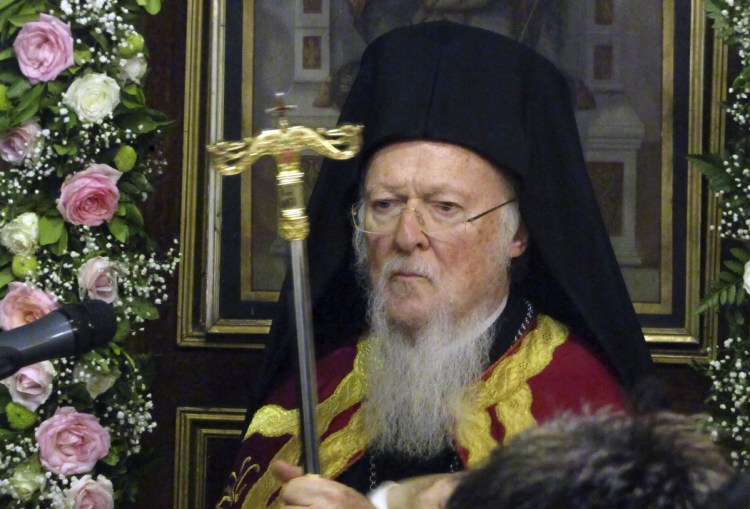ABOARD THE SHIP MORE SPACIOUS THAN THE HEAVENS — Off the Greek island of Spetses, the leader of 300 million Christians worldwide told a group of nearly 200 religious leaders, academics and activists that they needed to move beyond intellectualism when it came to the environment.
“What remains for us is to preach what we practice,” said Orthodox Ecumenical Patriarch Bartholomew of Constantinople, turning a traditional phrase on its head. “Now we must begin the long and difficult way from the mind, to the heart. … May God guide you in your service to his people and the care of his creation.”
The environment has defined 78-year-old Bartholomew’s tenure for more than a quarter century: The gathering at sea this month was the ninth he has organized since the mid-1990s. This one focused on Attica, the peninsula surrounding Athens, Greece that juts out into the Aegean Sea, and Bartholomew brought together scientists and clergy to examine the state of water bodies ranging from the Danube and Amazon rivers to the Baltic and Adriatic seas and the Arctic Ocean.
In November 1997, he delivered an address in Santa Barbara, California, where he officially classified crimes against the natural world as sins.
“For humans to cause species to become extinct and to destroy the biological diversity of God’s creation; for humans to degrade the integrity of Earth by causing changes in its climate, by stripping the Earth of its natural forests, or destroying its wetlands; for humans to injure other humans with disease for humans to contaminate the Earth’s waters, its land, its air, and its life, with poisonous substances,” he told a crowd that included then-Interior Secretary Bruce Babbitt. “These are sins.”
Pope Francis has likewisedrawn global attention to environmental activism: On the same day Barthlomew was concluding his conference in Greece, the pope brought the leaders of multinational energy and investment firms to the Vatican to discuss the path forward on climate change.
At a time when some political leaders have become more cautious about – or have outright rejected – policies aimed at curbing greenhouse gas emissions, several major faith leaders are making environmental care a top spiritual priority.
But they have also struggled to inspire some of their congregants into action.
“Even when there’s a will, there is not always a willingness to act,” said Nigerian Cardinal John Olorunfemi Onaiyekan, one of two cardinals who traveled to the patriarch’s conference. “The spirit is willing, but very often the flesh is weak.”
Still, Onaiyekan and others who had journeyed to Greece for the three-day “Green Attica” conference emphasized that they would persist in raising the moral and ethical dimensions of climate change.
In his home country of Nigeria, Onaiyekan said in an interview that “there is a kind of ambiguity about climate change” because it is “a nation largely dependent on oil revenue.” But those living on the Niger Delta have experienced the damage associated with oil production firsthand, he said. It would be naive, he said, to expect companies and governments to shift on their own.
“If you are waiting for them to change, you will wait till Jesus comes back again,” he said. “We feel the only area where we can actually make an impact is to constantly keep challenging our leaders to stop killing us. Stop killing your people.”
Francis – who issued the first papal encyclical focused solely on the environment, “Laudato Sì,” in 2015 – pressed this message during his private audience earlier this month with executives from ExxonMobil, Eni, BP, Royal Dutch Shell, Equinor and Pemex.
Calling climate change “a challenge of epochal proportions,” the pope said that the private sector had taken modest steps toward incorporating climate risks into its business models and funding renewable energy.
“Progress has indeed been made,” he told the group as he wrapped up the two-day session. “But is it enough?”
Former energy secretary Ernest Moniz, who attended the meeting, said in an interview that participants discussed “the moral and ethical dimensions” of climate change, as well as ways to shift to a low-carbon path. “Everybody was there trying to find a way to go forward,” Moniz said.
The patriarch, who resides in Istanbul, has spent years bringing together unlikely allies while also seeking to reorient the Orthodox Church. In 1989 his predecessor, Patriarch Dimitrios I, designated Sept. 1 as a day of prayer for the welfare of all creation, and Barthlomew has expanded upon this initiative.
Send questions/comments to the editors.



Comments are no longer available on this story